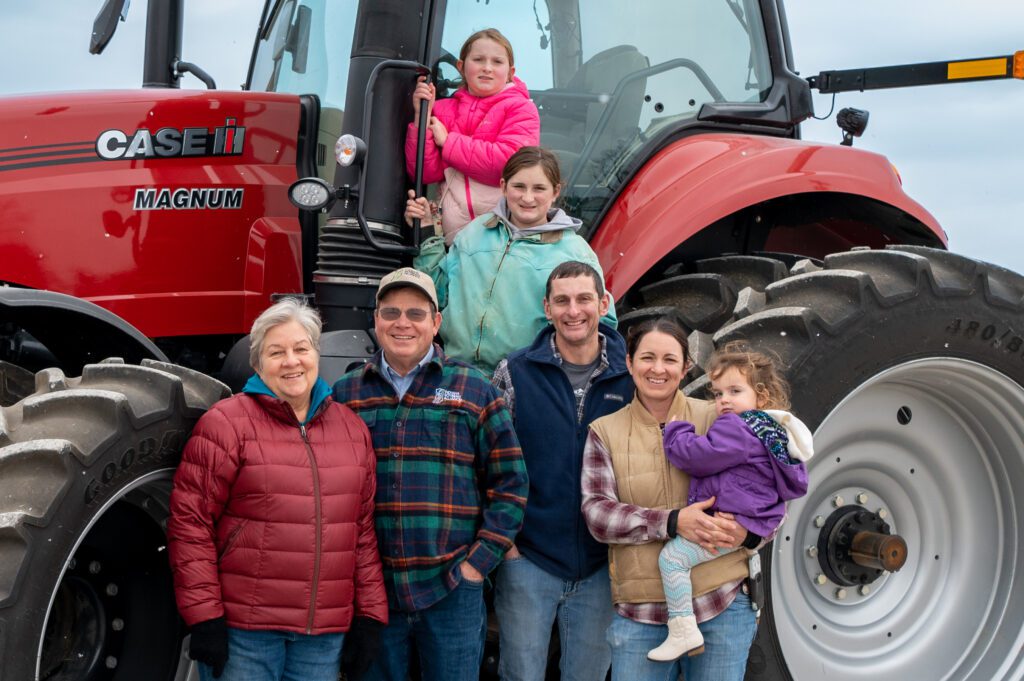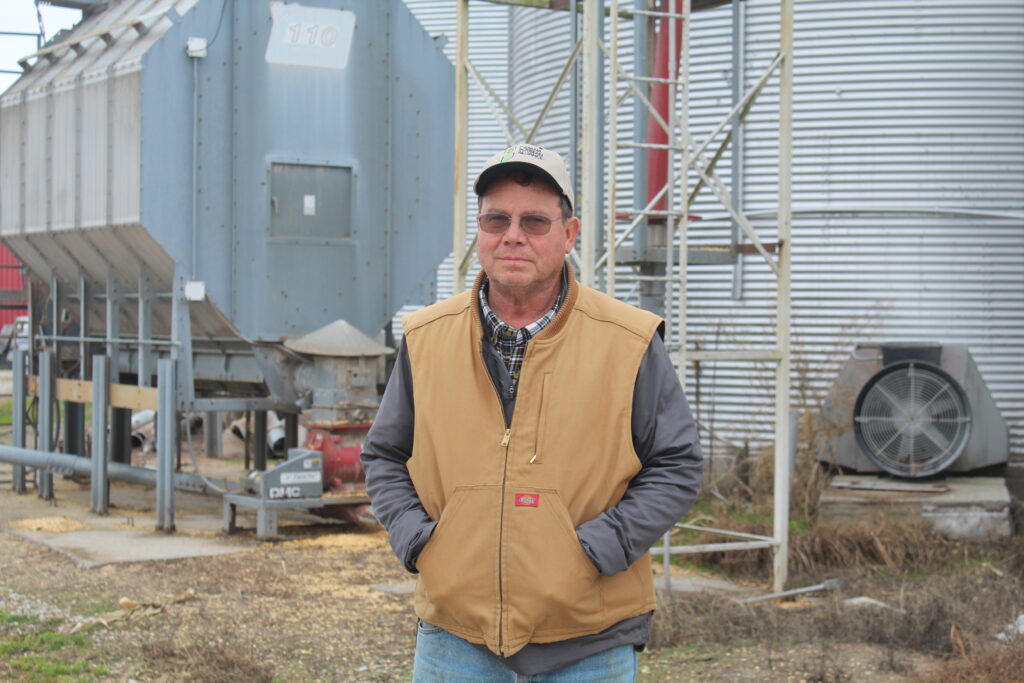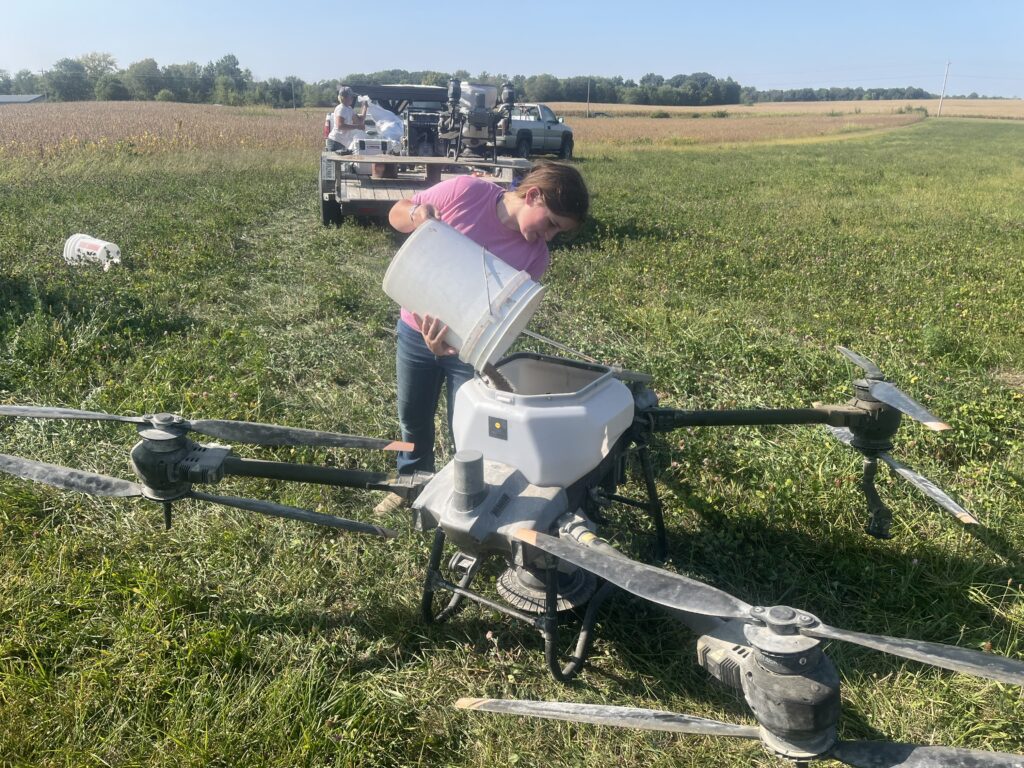Good relationships, continuous improvement among the values that guide the Legan farm
By Dave Blower Jr.

Mark Legan is the oldest of five children. His father was a self-employed brick mason in Johnson County, Ind. In the summer of 1975, young Legan was helping his father build a new fireplace in a neighbor’s house. That neighbor was a farmer, who had 50-60 sows on pasture gestation, and he needed help.
“That farmer offered me $2 an hour to come work for him, and that was $2 an hour more than dad was paying me,” Legan mused. “So, I went to work for that farmer for a couple of years as I finished high school. Dad turned around and hired my best friend and paid him $2.50 an hour to take my place. But, as I look back, that was a formative time where I was exposed to farming. We were moldboard plowing fields, sows were outside, we would turn sows in and out of farrowing, but I enjoyed all of that.”
These days, Mark Legan shares ownership of Legan Livestock and Grain in rural Putnam County near Coatesville, Ind., along with his wife, Phyllis, and his daughter and son-in-law, Beth and Nick Tharp. The family operates a 2,200-sow, breed-to-wean pork farm and 1,050 acres of crop land.
With an eye on the industry’s future and a sense of service, Legan is also a board director for the Indiana Soybean Alliance (ISA), and he represents oilseed farmers on the U.S. Meat Export Federation (USMEF).
Shortly after Beth and Nick joined the farm in 2010, the family farm focused on adopting core values that Legan believes is guiding the farm toward better decisions each day. These values include:
- Integrity – which Legan defines as “doing what’s right when no one is looking.”
- Relationships – focusing on God, family, employees, community and consumers.
- Stewardship – which he said is “taking care of the God-given resources we have.”
- Continuous Improvement – is “being better tomorrow than we are today and not afraid to make mistakes,” Legan said.
Although these principles were adopted by the Legan-Tharp family in 2012, many of these have been followed since Legan first launched his farm in 1989.
Continuous Improvement
After earning a degree in animal science from Purdue University, Legan wanted to work toward a master’s degree from Purdue, so he ended up going to work for Purdue Extension, which offered to pay for his master’s coursework in exchange for a five-year commitment.

“I started out as an ag agent in Jennings County for a year and a half, and then I was in Putnam County for six years,” he explained. “Extension was very good to me. Not growing up on a farm, it helped me to understand production agriculture and to problem solve. I also learned to work with people.”
Extension work led to his future farm. “The early 1980s were turbulent from a financial standpoint,” Legan said. “I was trained as a farm management agent to work with families using financial analysis programs. I saw there were farmers that were still thriving during that downtime. It seemed to me that most of it came back to management. I got to thinking, after I got my master’s and fulfilled my commitment with Extension that I would like to try farming. And there’s my wife, Phyllis, one in a million, who allowed me to leave a job with a steady paycheck to try farming.”
Phyllis didn’t grow up on a farm, either, and everything has been a learning experience for her, too.
Legan had neighbors who were willing to work with him. “I credit the Ames family with helping us get started,” he said. “I believe we wouldn’t be farming if it wasn’t for their help. They had a large crop farm and some older hog facilities. They worked with us on a 50-50 arrangement to help us get started.”
Growing the pork business was important. “We made our share of mistakes over the years, but that comes back to our core values – one of those being continuous improvement – we’re not afraid to make mistakes,” Legan said. “We like to keep our mistakes small and manageable, real learning experiences. We also want to be better tomorrow than we are today.”
Good relationships
Sometimes the timing of certain business decisions was off and required help from others. That’s where the value of relationships plays a role. In 1998, things were going well for Legan. He depopulated some older hog buildings, and he moved the sows indoors into new buildings – then pork prices fell drastically.
“Pig prices dropped to $8,” Legan lamented. “The whole time we’ve been farming, we’ve been with the same local banker here. I still remember walking into the bank office in 1998 with the keys to the new buildings that we had just completed that fall. I tossed the keys on his desk and told him we were upside down. He asked what he was going to do with the farm. Then he said, ‘we’ll figure out a way,’ and that banker stuck by us. Things like that mean a lot.”
Legan delights in both long-lasting and brand-new relationships. “If it wasn’t for relationships, we would not be farming now,” he said. “As we talk about relationships, we talk about the relationship we have with God, and the relationships we have with each other as a family. We have an important relationship with our 10 full-time employees; we have a relationship with the community. Then we’ve got business relationships. We’ve been in various machinery share arrangements for the last 25 years because we’re not a large crop farm. It’s important to be able to utilize the resources we have. Actually, that’s the purpose of our farm: To utilize our God-given resources to the best of our ability.”
Legan Livestock and Grain partners with the Morton family farm in Boone County and the Douglas family farm in Shelby County to finish the 60,000 pigs per year Legan farrows. Douglas Farms is owned by former ISA Director and Board Chair Jim Douglas of Flat Rock, Ind. Douglas also serves on the USMEF Board representing soybean growers from the United Soybean Board.
Legan appreciates his relationships with Douglas and Morton. “Opposed to a straight contract arrangement, they have skin in the game to take care of the pigs,” Legan said. “They receive a contract payment for taking care of them. Both of those families have larger crop farms. So, they have a crop base to utilize the manure better than what we can. We share in the profits, and we share in the losses while being able to manage the system.”
Focus on Stewardship

Taking care of those God-given resources, for Legan, means adopting no-till practices and cover crops. In a way, he’s still an ag educator – testing techniques, trying new practices and sharing the information with his neighbors. “I’d like to say we’re 100 percent no-till, but we will use tillage with a purpose,” Legan said. “One thing about no-till is you’ve got to have well-drained soils. All of the land we farm is pattern-tiled. We try to work with landowners to tile the rented ground we farm. One thing I’ve found, you’ve got to work the fields you tile to get them smoothed out.”
He is a believer in cover crops.
“We try to use cover crops on 100 percent of the ground going to corn soybeans,” Legan said. “We’ve tried a lot of different seeding practices in the last 15 years. We’ve kind of dumbed it down to where we’re basically a cereal rye base for cover crop and brassicas where we can. But there’s kind of a trade-off in weed control, in my opinion, with the cover crops. We’ve seen an increase in water hemp. It’s very hard to control, and we have had to layer residual herbicides, which makes it more difficult to establish some cover crops.”
Freely sharing this information extends Legan’s stewardship efforts beyond his own farm. He said Putnam County farmers have been known to be conservation-minded for many years. Barry Fisher, a former conservationist with the USDA’s National Resource Conservation Service, would host regular meetings with area farmers to discuss new strategies and the results.
“I have to credit Barry Fisher in helping facilitate cover crop and no-till use in Putnam County,” he said.
“This local group was not afraid to share with each other what works and what doesn’t all the way from cover crop species and planting techniques to tiling and other topics. No till and cover crops take a lot higher level of management than going out and tilling the soil. Your mistakes can be magnified if you don’t dot all your I’s and cross all your T’s. That group provided support for some to give it a try.”
Integrity and family
Legan first got started in checkoff work through the Indiana Pork Producers. He saw value in the work the checkoff brought to pork producers. Later, he believed the state’s soybean checkoff program would do the same for row-crop farmers. However, Legan also finds value in being an active, paid member of ISA’s Membership and Policy Committee.
Being a paid member is also important because checkoff funds cannot be used for advocacy work.
“So many things that affect what we do on a farm anymore are determined in Washington D.C. and Indianapolis,” he said. “You’re either at the table or you’re on the menu. Agriculture has more than its fair share of detractors, but it’s important that our legislators and members of Congress know that we want to have a relationship with them. We’re very fortunate right here with (U.S. Rep.) Jim Baird being a friend to farmers and understanding agriculture before he became a politician. He’s comfortable picking up the phone and asking my opinion – or other farmers – on a variety of topics. If somebody’s going to tell our story and write the narrative, who better to do it than someone who is in the fight every day.”
Baird was the Putnam County Purdue Extension Educator just before Legan took the post in the 1980s.
Finally, Legan is pleased to have had Beth and Nick Tharp join the farm. “I like to say that when they came to the farm, we quadrupled our brain power,” he said.
Nick’s role is as the Director of Pork Operations. He oversees the management of the sows and eight full-time employees. Beth has accounting, finance and risk management responsibilities. She is also the owner of a business called LT Farm Meats, which offers pork, beef and lamb products from the farm. The “LT” stands for Legan and Tharp.
“She started the business in 2018, and COVID gave it quite a boost,” Legan said. “There’s a lot of potential with that business, especially in the Indianapolis area.”
Beth and Nick are the parents of the Legans’ three granddaughers: Kate, Hannah and Grace.
Click here for more information about the meat business.
Posted: January 16, 2025
Category: Indiana Corn and Soybean Post - January 2025, ISA, News, Producer Engagement, Sustainability



